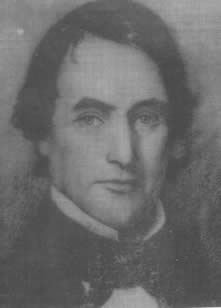

In late 1852, he resigned from the Senate and set sail for Havana, Cuba. Although the ticket was victorious, King was forced to leave Washington, D.C., soon after the general election, taking his physician's advice to seek a warmer climate.

He continued to campaign tirelessly for a Democratic victory, which he believed essential to keep the country united. Tomb of William Rufus KingDuring the subsequent campaign, King became increasingly ill, showing the signs of worsening tuberculosis. The men shared largely equal support, and the Alabama legislature was evenly divided in its support of the candidates, but Lewis ultimately won the seat. In 1847, he ran against ardent states' rights supporter Dixon Hall Lewis. Having successfully completed his mission, King returned to Washington with his family members in 1846 and began a campaign for his return to the Senate. King skillfully negotiated the politics of the French court and entertained the monarch and other important figures at lavish events, eventually gaining the king's promise to remain neutral in the Texas issue. King, along with his niece, Catherine Ellis, two nephews, and a servant traveled to France and met with King Louis Philippe. John Tyler appointed the erudite and politically skilled King as minister to France. Fearing that France might join forces with Great Britain in thwarting U.S. Reuben ChapmanIn 1844, tensions over the status of the territory of Texas had strained relations between the United States and France. When the 1844 presidential election approached, some Democratic Party members suggested a Buchanan-King ticket, but the pairing gained little traction. Richard Mentor Johnson was again chosen as Van Buren's running mate, but their ticket was defeated by that of Whig William Henry Harrison and Democrat John Tyler. King received little support outside of Alabama, even in his home state of North Carolina, and he soon withdrew his name. As the 1840 Democratic Convention drew near, Democratic newspapers in Alabama began to promote King as a running mate for incumbent Pres. Any negative reactions to their relationship appear to have had little effect, and the men continued with their living arrangements and their work as legislators. Neither man ever married, and by 1836 they were sharing a residence in Washington. Rumors also circulated in Washington, D.C., at the time, and they increased after King entered into a close friendship with fellow senator James Buchanan of Pennsylvania.

King was challenged to a duel, never carried out, with Dallas County planter Major Michael Kenan about a personal insult. James BuchananDuring the early 1830s, King was involved in an incident that reflects speculation about his sexual orientation that continues to the present day. He was also a firm advocate of the War of 1812. House of Representatives, where he established himself as a supporter of President James Madison. In 1811, he was elected to the first of three consecutive terms in the U.S. Soon after, he won election to a seat in the North Carolina House of Commons. In 1808, King opened his own law office in the Clinton, in Samson County. In addition to training in the law, Duffy also worked with King to develop his political skills. He spent the next several years under the tutelage of prominent attorney William Duffy in his Fayetteville law offices. In 1804, King left the university before completing his education to pursue the study of law. King was educated in private schools and entered the University of North Carolina in 1801, where he joined the Philanthropic Society, an important literary student association. William Rufus KingWilliam Rufus King was born on April 7, 1786, to William and Margaret DeVane King on the family plantation in Sampson County, North Carolina.


 0 kommentar(er)
0 kommentar(er)
